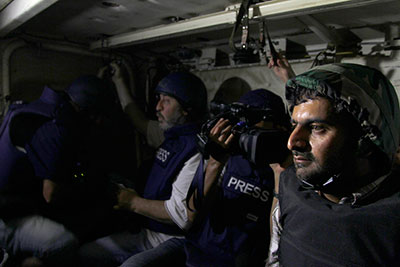Jordan arrests two journalists on aiding terrorism charges
New York, January 29, 2015–Jordanian authorities arrested the owner of a local news website and the site’s editor-in-chief on Wednesday, accusing the two of aiding terrorism and spreading false news in a report stating that an imprisoned Iraqi militant would be freed in a hostage negotiation deal, according to news reports.
Jordanian authorities raid station, arrest staff
New York, June 13, 2014–The Committee to Protect Journalists calls on Jordanian authorities to drop the terrorism charges and release from custody staffers of the Al-Abasiya TV station in Amman who were arrested after a recent raid and shutdown of the outlet.
Jordan’s free press record dims with website restrictions
Jordan’s press freedom climate, once a shining light in the Middle East, has quickly deteriorated as journalists grapple with last year’s government ban on nearly 300 news websites. Press freedom groups are documenting a rise in self-censorship and an increase in criminal cases against journalists. Local online news editors and journalists are complaining of economic…
Attacks on the Press in 2013: Jordan
Although Jordanian journalists continued to enjoy greater freedom than most of their regional colleagues, that freedom was nonetheless restricted. The government continued its attempt to control the online media as it already controls traditional media. As CPJ had warned last year, the Jordanian government used the amended Press and Publications Law to block hundreds of…

Arab journalists need training for civil unrest and wars
In recent years, Arab journalists have been taking great risks to report important stories in a region where war and civil unrest remain an ever-present threat. Many are operating without proper equipment or safety training in how to recognize and mitigate the various risks they face.
Authorities block hundreds of websites in Jordan
New York, June 3, 2013–The Jordanian government announced plans on Sunday to block more than 300 websites for failing to register under the Press and Publications Law, news sources reported. Access to several of the sites has already been blocked within the country, the reports said.
Attacks on the Press in 2012: Jordan
Although Jordanian news media enjoy greater freedom than the press in many other Arab countries, the kingdom took a significant step backward with the approval of amendments to the Press and Publications Law in September 2012. The law imposed new restrictions on online news content, required sites to obtain official licenses, and gave the authorities…